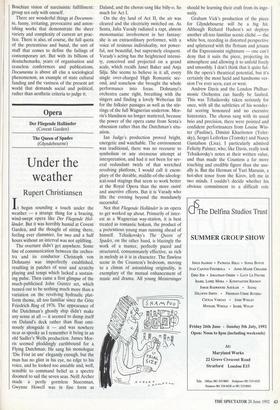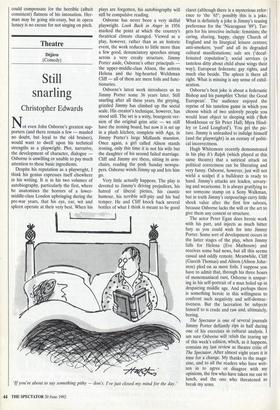Opera
Under the weather
Rupert Christiansen
It began sounding a touch under the weather — a strange thing for a bracing, wind-swept opera like Der Fliegende Hol- lander. But it was horribly humid at Covent Garden, and the thought of sitting there, feeling ever clammier, for two and a half hours without an interval was not uplifting.
The overture didn't get anywhere. Some line of communication between the orches- tra and its conductor Christoph von Dohnanyi was imperfectly established, resulting in patches of sour and scratchy playing and tempi which lacked a sustain- ing pulse. Then came a first glimpse of the much-publicised John Gunter set, which turned out to be nothing much more than a variation on the revolving hydraulic plat- form theme, all too familiar since the Glitz Friedrich Ring of 1976. The appearance of the Dutchman's ghostly ship didn't make any sense at all — it seemed to dump itself on Daland's deck rather than float omi- nously alongside it — and was nowhere near as spooky as I remember it being in an old Sadler's Wells production. James Mor- ris seemed ploddingly earthbound for a Flying Dutchman. He sang his monologue 'Die Frist ist urn' elegantly enough, but the man has no glint in his eye, no edge to his voice, and he looked too amiable and, well, sensible to command belief as a spectre doomed to sail the seven seas. Neill Archer made a pertly gormless Steersman, Gwynne Howell was in fine form as
Daland, and the chorus sang like billy-o. So much for Act I.
On the dry land of Act H, the air was cleared and the electricity switched on. As Senta, Julia Varady radiated a rapt, almost monomaniac involvement in her fantasy: she is an extraordinary performer, with a voice of resinous individuality, not power- ful, not beautiful, but supremely eloquent. Varady's acting has the heightened intensi- ty, conceived and projected on a grand scale, which recalls Janet Baker and Anja Silja. She seems to believe in it all, every single over-charged High Romantic sec- ond, and somehow she brought the whole performance into focus. Dohnanyi's orchestra came right, breathing with the singers and finding a lovely Weberian lilt for the folksier passages as well as the stir- rings of the full Wagnerian undertow. Mor- ris's blandness no longer mattered, because the power of the opera came from Senta's obsession rather than the Dutchman's situ- ation.
Ian Judge's production proved bright, energetic and watchable. The environment was traditional, there was no recourse to symbolism or any strenuous attempt at interpretation, and had it not been for sev- eral redundant twirls of that wretched revolving platform, I would call it exem- plary of the durable, middle-of-the-ideolog- ical-road stagings that seem to work better at the Royal Opera than the more outré and assertive efforts. But it is Varady who lifts the evening beyond the mundanely successful.
Not that Fliegende Hollander is an opera to get worked up about. Primarily of inter- est as a Wagnerian way-station, it is best treated as romantic hokum, the product of a pretentious young man running ahead of himself. Tchaikovsky's The Queen of Spades, on the other hand, is blazingly the work of a master, perfectly paced and structured, consummately effective, as rich in melody as it is in character. The flawless scene in the Countess's bedroom, moving to a climax of astonishing originality, is exemplary of the mutual enhancement of music and drama. All young Meistersinger
should be learning their craft from its inge- nuity.
Graham Vick's production of the piece for Glyndebourne will be a big hit. Although Richard Hudson's set deploys another all-too familiar scenic cliché — the white box, receding in distorted perspective and splattered with the flotsam and jetsam of the Expressionist nightmare — one can't deny that it suits the piece, projecting its atmosphere and allowing it to unfold freely and smoothly. I don't think that it quite ful- fils the opera's theatrical potential, but it's certainly the most lucid and handsome ver- sion I've ever seen, east or west.
Andrew Davis and the London Philhar- monic Orchestra can hardly be faulted. This was Tchaikovsky taken seriously for once, with all the subtleties of his wonder- ful scoring honoured and no excessive histrionics. The chorus sang with its usual brio and precision, there were pointed and confident performances from Louise Win- ter (Pauline), Dimitri Kharitonov (Yelet- sky), Sergei Leiferkus (Tomsky) and Nancy Gustafson (Lisa). I particularly admired Felicity Palmer, who, like Davis, really took Tchaikovskys notes at their written value, and thus made the Countess a far more touching and credible figure than she usu- ally is. But the Herman of Yuri Marusin, a hot-shot tenor from the Kirov, left me in two minds. I couldn't decide whether his obvious commitment to a difficult role could compensate for the horrible (albeit consistent) flatness of his intonation. Her- man may be going stir-crazy, but in opera lunacy is no excuse for not singing on pitch.



























































 Previous page
Previous page